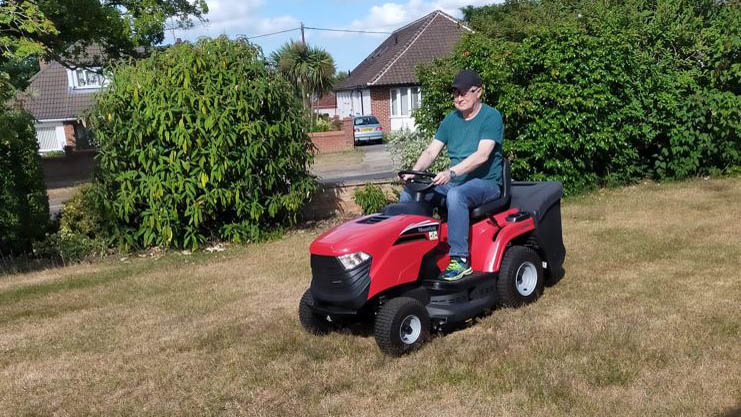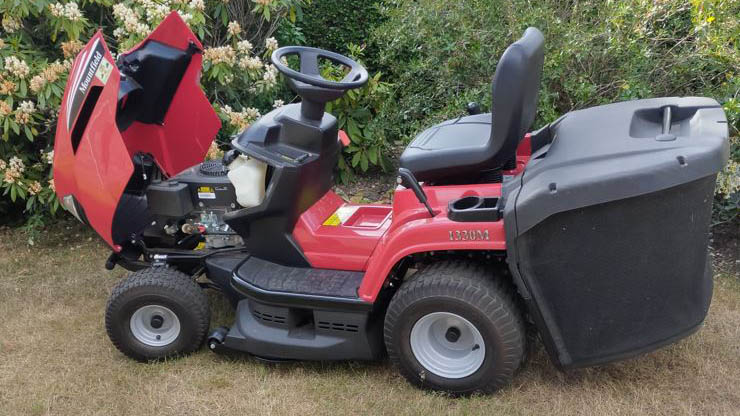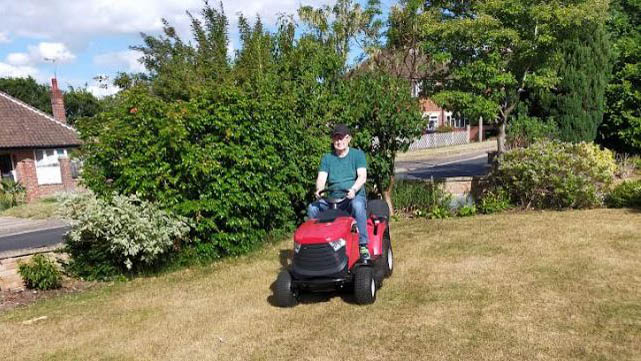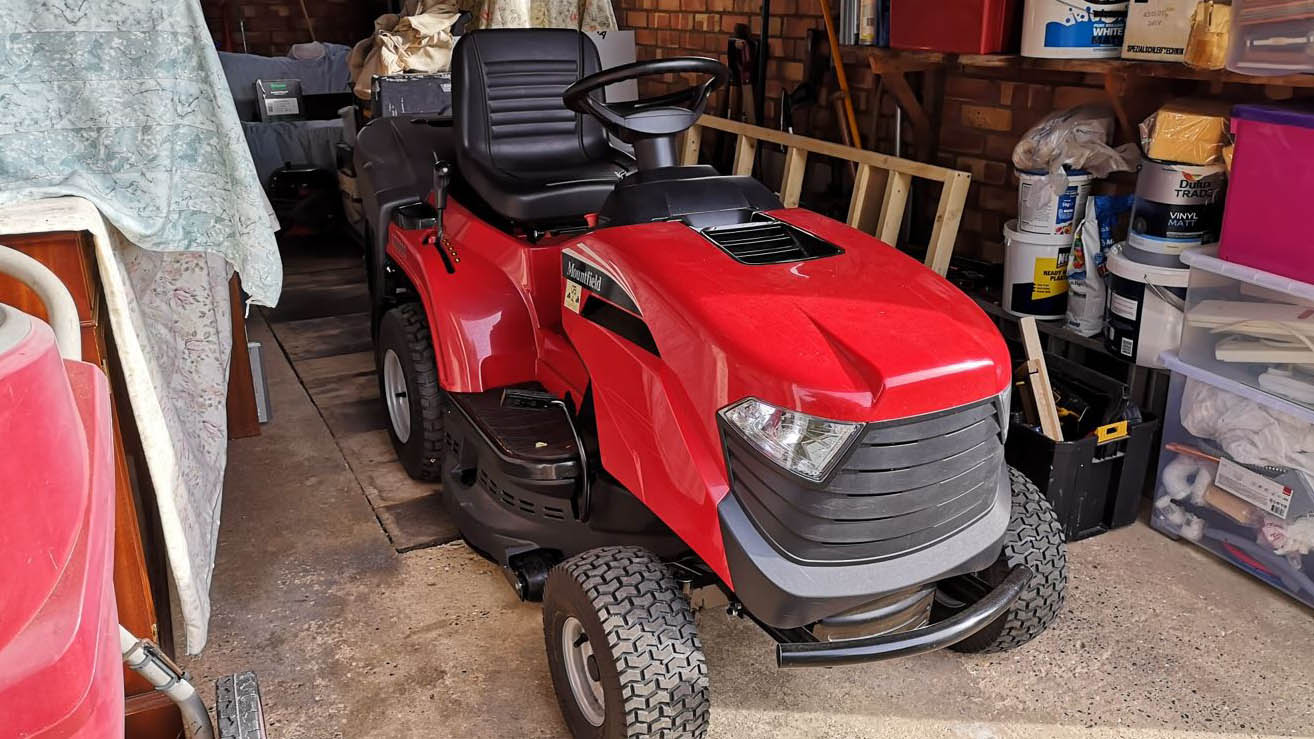My Dad just treated himself to a riding lawn mower — here’s what happened
This changes everything

Since retiring and moving to a new property, my parents’ biggest hobby has been gardening. From pruning the hydrangeas, to getting rid of any dandelions, their backyard is an ongoing project that they take great pride in. However, my Dad encountered a problem when he realized that his new home came with a sizable lawn. The result — hours of pushing a traditional electric lawn mower by hand, likely making all sorts of lawn care mistakes in the process.
Consequently, my Dad struggled with the effort required to cut the grass and ended up feeling all sorts of aches and pains. He had to think of an alternative approach. While he had the option to hire help, my Dad loves to upkeep his yard himself, so didn’t want to give away the workload. He decided to treat himself to something he always wanted instead — a riding lawn mower.
Why buy a riding lawn mower?
My Dad had always wanted a riding lawn mower, but he never really had a big enough yard or the right layout for it before. Instead, he used a manual electric lawn mower which he would push back and forth with cables strewn across the grass. It was a nightmare in his words because you had to avoid any cables as you mowed and you were limited by the cable length too.
Even though the lawn was smaller in the previous property, it still took an hour to cut the grass. The previous yard also wasn’t an ideal shape for a riding lawn mower because of tight areas and restricted access in places.

My parents’ new property came with an open, wraparound garden, which provided the perfect conditions for a riding lawn mower. So my Dad took the plunge and said goodbye to cables. He opted for a gas-powered mower, but battery-powered mowers which you can recharge between runs are gaining in popularity. My Dad bought the Mountfield 1330M, which is currently available in the UK, but not the U.S. However, you can find plenty of models in most home department stores and on Amazon.
The pros of a riding lawn mower
First of all, my Dad really loves the speed and efficiency his new lawn mower provides. It used to take about one hour and 30 minutes to cut the grass with a manual mower, whereas the riding mower completes the chore in about 30 minutes. Not only are you saving that time, but you’re saving the effort of pushing the lawn mower around; with some weighing as much as 60 pounds, that’s a big difference to the manual labor involved.
The process is partly quicker because the riding mower is wider with a longer blade than traditional mowers, so you cut more grass with each pass. It also moves at a faster rate than my Dad could achieve, with five forward gears and one to reverse. It picks up and deals with anything in the way, whether that's dandelions or leaves. That’s great for cleaning up the lawn in the process, but you need to be careful that nothing is left on the grass that shouldn’t be.
My Dad also feels that the riding lawn mower is a joy to drive — more like a tractor rather than a car. This makes the process of cutting the lawn much more enjoyable and he actually looks forward to the task now. With seven length settings to cut the grass, he also has more control than he ever had before, and he’s been able to find the best settings to align the edges with the bulk of the lawn.

There’s no real difference in terms of noise output versus a traditional mower, and my Dad finds it comfortable to sit in the driver's seat for long periods of time as well. Riding lawn mowers can feature versatile designs on top of this — on my Dad’s model, you can even buy accessories to fit on the back if you want, such as a trailer.
It’s also a cinch to empty versus a traditional mower; once the canister is full of clippings, it can be self-emptied quickly and neatly onto the ground and then scooped up to go in the compost heap. It also lasts a lot longer between emptying thanks to a much larger canister.
The cons of a riding lawn mower
My Dad found few faults with his new mower, but that’s not to say they were non-existent. His main issue is that it’s not good for the intricate or narrow parts of the lawn. As ride-on lawn mowers are larger and more bulky than push mowers, they’re not typically as maneuverable. That means a riding lawn mower likely wouldn’t suit those with awkward layouts and tight spaces in their lawn.
Because of the sheer size, my Dad also noticed that to reach into areas under shrubs, he had to essentially drive into it. You can’t tuck the mower under the bushes like you can with a traditional design. It’s easy to forget that you’re essentially a part of the lawn mower as you ride it too. My Dad finds his face catches hanging branches on a regular basis, and has to wear safety googles now as a consequence.

Because of the size, you need a lot more space to store it, too. A ride on lawn mower is essentially the size of a motorbike, and you can’t really store it outside. Luckily, my Dad has plenty of room in his garage, so this wasn’t an issue.
Depending on the kind of mower you opt for, bear in mind you may also need to store excess gas or find somewhere to charge the battery. My Dad invests in gas preservatives to help extend the lifespan of the fuel he stores. If you opt for a gas mower, it should be serviced once a year as well, which is an ongoing cost.
The verdict
My Dad definitely loves his latest toy, but he would only recommend it to those that have a big enough lawn and space to store it. You also need to consider the layout of your land — riding lawn mowers can handle hills, but tight areas might cause a problem. Plus, if you can’t drive it from your backyard to your front, you might be limited to one section of your lawn. These aren’t a cheap investment either, with most models costing upwards of $2,000, so you need to make sure it’s right for you before you buy.
Having said that, it has revolutionized the way my Dad cuts the grass, and neighbors do seem green with envy whenever they see him out and about on it. He now enjoys the chore more than ever as well, so it’s a win-win situation.
For more outdoor tips, tricks, and how-tos, check out our guides on how to plant sunflower seeds and when to do it, how to plant potatoes and how to grow tomatoes in pots. You'll also want to read how to plant grass seed and how to make your grass greener.
Sign up to get the BEST of Tom's Guide direct to your inbox.
Get instant access to breaking news, the hottest reviews, great deals and helpful tips.

Katie Mortram used to be a Homes Editor for Tom's Guide, where she oversaw everything from kitchen appliances to gardening tools, as well as smart home tech. Specializing in providing expert advice for cleaning and home manintenance, she now works as Household Advice Editor for Good Housekeeping.
